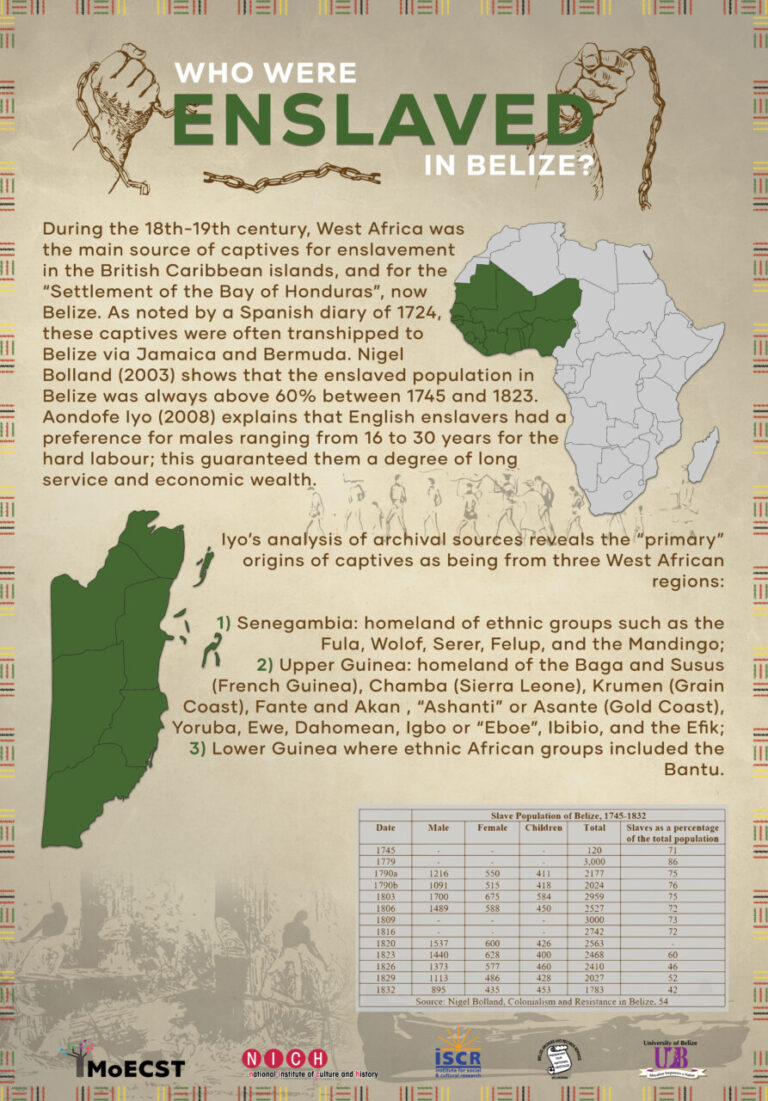Perspectives from Delmer Tzib, History Lecturer of UB, and Rolando Cocom, Director of NICH-ISCR
The British came to Belize for one main reason: to build their wealth. To address this, they imported and enslaved Africans to satisfy the labor demands of extracting logwood and, later, mahogany timber. Many enslaved Africans came primarily from West Africa. They were forcibly taken from their homelands and brought to the Caribbean and, consequently, Belize.
Historian Nigel Bolland argues that some of the enslaved “may have been seasoned in the West Indies and some were born there, yet others must have been brought from Africa via the Jamaica slave markets.” Similarly, Historian Assad Shoman cites a report which states that Africans were imported from the Bermudan enslavement markets.
Enslaved Africans underwent grueling conditions in the transatlantic enslavement trade, chiefly operated by the British. An estimated total of around 13 million Africans were packed into ships under cruel conditions, facing diseases, malnutrition, and abuse. Once Africans arrived in Belize, many of them worked in camps extracting forest products. They endured dangerous and harsh living conditions.

However, enslaved Africans were more than just enslaved laborers. They brought their traditions, languages, and cultures with them. In the Caribbean and in Belize, they resisted enslavement and made a profound impact on Belizean society and achieved full legal emancipation on 1 August 1838. This vibrant African culture and heritage in Belize can be observed in the music, dance, food, and languages of both the Kriol and Garinagu of Belize.
Key Takeaways:
- The British came to Belize seeking wealth through logwood and mahogany.
- Majority of the enslaved Africans in Belize, and the Caribbean, were from West Africa.
- Africans endured brutal conditions but brought rich traditions, languages, and cultures.
- Africans resisted enslavement and profoundly influenced the creation of Belizean society.
Join us at the upcoming Eboe Town Festival at the Yabra Green in Belize City on 1 August 2024, learn more here: Eboe Town Festival 2024
To download a copy of the infographic, click here: Emancipation Infographic one
Suggested readings:
- Shoman, Assad. A History of Belize in 13 Chapters
- Bolland, O. Nigel. Colonialism and Resistance in Belize: Essays in Historical Sociology
- Iyo, Aondofe. Towards Understanding Belize’s Multi-Cultural History and Identity.
Written by
Delmer Tzib – History Lecturer at the University of Belize
Rolando Cocom – Director of the Institute for Social and Cultural Research (NICH ISCR)



Add your first comment to this post